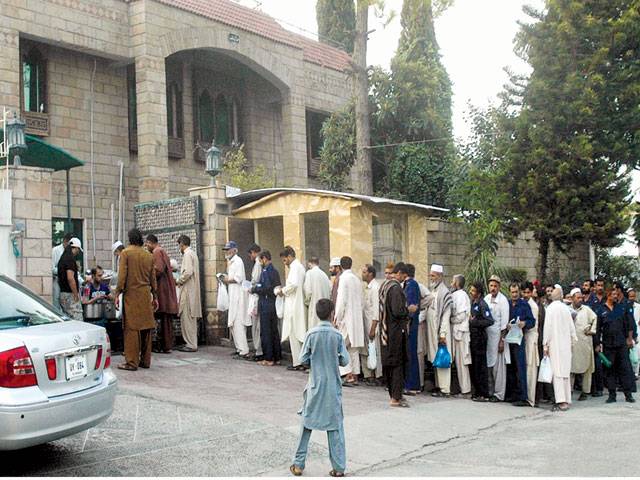ISLAMABAD - If you are in the federal capital while observing fast and somehow you are still on the road and iftar time is approaching fast, you neither need to panic nor for over-speeding, look around, you will find many outlets along roads offering free iftar.
You can find these meals at highways, business centres and mosques. Anywhere people sitting on floor mats, having food items in front of them, and there is no shop or cafeteria around, this is the venue of free iftar; don’t hesitate to join them. It happens daily in Ramazan around 06:00pm, a few people appear from somewhere at Kashmir Highway, near fire brigade office, and start lying serviette at the green belt between the two roads. They burn some woods and start frying pakoras in a big steel pan. The whole atmosphere is filled with the mouth-watering smell of pakoras. The smell of fruits, juices and other eatables hangs in the air as those men serve the food on the mats.
And suddenly the whole place is filled with people and calmness on the faces of the faithful, in addition to smell of food, creates a touching scene. This whole episode has been repeated daily since the beginning of Ramazan.
Clad in ordinary shalwar kameez these men do not seem to be wealthy by any prevailing standard of the society.
“We arrange free iftar for the will of Allah and this is to facilitate travellers and others who are less fortunate,” Khadim Hussain, an organiser of the roadside free meal, told The Nation in a content voice.
At a time when the people have become more materialistic and practical, this charity service could be seen on roads in most of marakiz (business centres) and mosques.
“Ramazan is not only to fast but it is to serve other human beings, take care of their needs and share the blessings of God with others, which is a way to thank God,” Ghulam Rasool expressed in a sweet voice. He arranges free meals throughout the year in Karachi Company on a small-scale, however, in Ramazan, his dining table becomes larger.
In Karachi Company there is another permanent free meal spot run by a man with long hair Ali. He has been running this free meal service for many years. Belonging to lower-middle class he has devoted his evenings for the preparations of meals while he works to feed his family in the morning.
Opposite to the bus stand of Karachi Company, this place is easy to spot due to its large banner, “Human Lovers’ Society, 365 people are required.”
“I started free meals with my limited resources and then the people started contributing,” he explained. He added now hundreds of people daily benefit from this free service and this number increases manifolds in Ramazan.
Explaining ‘365 people are required’ he said it was to attract contributors. He said he asks people to contribute for one-day meal. In this way he runs this charity for the whole year.
“The people of Islamabad are very generous. Sometimes I receive contribution from people who themselves need financial assistance but they contribute,” he said.
Free meal distribution points can also be seen at many places including Aabpara Market, F-10 Markaz and Peshawar Morr. Many of the tandoor (oven) owners also offer free bread with the cooperation of the people.
Zahoor Ahmed, a resident of Islamabad who had come to contribute money for free bread, opined that people of the country are very generous; they can donate to get rid of foreign loans or menace of electricity loadshedding, but the governments have lost their trust. “The government in the past announced a scheme ‘Qarz Utaaro, Mulk Sanwaro’ and people donated generously, even they donated the money they had saved for the marriages of their children, but nothing happened,” he sighed sadly.
According to reports of nongovernmental organisations including Pakistan Centre for Philanthropy (PCP) and Bain and Company, Pakistanis contributed Rs 140 billion (US $1.7 billion), nearly 1 per cent of the national gross domestic product (GDP) of $170 billion, in 2009.
In another report compiled by PCP, more Pakistanis donate to charities and the country saw the “largest jump in the rankings globally of 108 places, moving from 142nd to 34th in 2011,” according to World Giving Index 2011.
Social scientists believe that most of the charity on local level remains unrecorded and if the all charity is calculated, Pakistan could jump more on global ranking.
Friday, April 19, 2024
Free meal service in Ramazan: a religious feature of Islamabad

Caption: Free meal service in Ramazan: a religious feature of Islamabad
PTI dubs president, PM ‘illegal' despite Zardari's call for ending polarisation
1:05 AM | April 19, 2024
Five Customs officials gunned down in DI Khan
1:04 AM | April 19, 2024
King Charles's cancer ‘eating him alive,' monarch unable to perform duties: Insider
1:02 AM | April 19, 2024
Mehwish Hayat says she would like to work with Aamir Khan
9:59 PM | April 18, 2024
Hepatitis Challenge
April 18, 2024
IMF Predictions
April 18, 2024
Wheat War
April 18, 2024
Rail Revival
April 17, 2024
Addressing Climate Change
April 17, 2024
Justice denied
April 18, 2024
AI dilemmas unveiled
April 18, 2024
Tax tangle
April 18, 2024
Workforce inequality
April 17, 2024
New partnerships
April 17, 2024
ePaper - Nawaiwaqt
Advertisement
Nawaiwaqt Group | Copyright © 2024





